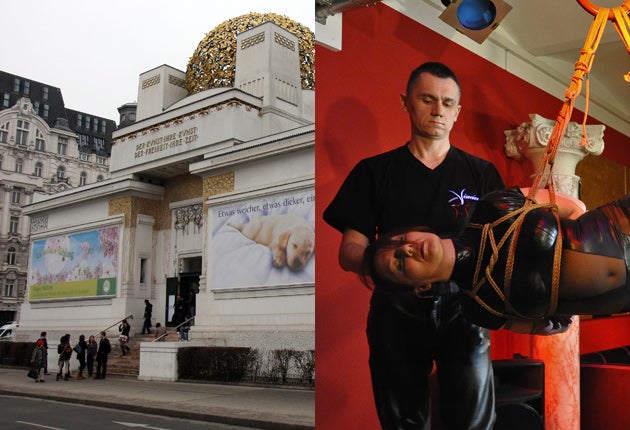Art gallery by day – bondage club by night
Project linking museum with its taboo-breaking past angers conservative Austria

Your support helps us to tell the story
From reproductive rights to climate change to Big Tech, The Independent is on the ground when the story is developing. Whether it's investigating the financials of Elon Musk's pro-Trump PAC or producing our latest documentary, 'The A Word', which shines a light on the American women fighting for reproductive rights, we know how important it is to parse out the facts from the messaging.
At such a critical moment in US history, we need reporters on the ground. Your donation allows us to keep sending journalists to speak to both sides of the story.
The Independent is trusted by Americans across the entire political spectrum. And unlike many other quality news outlets, we choose not to lock Americans out of our reporting and analysis with paywalls. We believe quality journalism should be available to everyone, paid for by those who can afford it.
Your support makes all the difference.A venerated Vienna museum has provoked a furious political row after opening a swinging, bondage and S&M club on its premises in an attempt to encourage debate about the role of scandal in art.
The club is housed in the basement of the Secession museum, the home of Austria's once taboo- breaking Jugendstil art movement. Elsewhere there are works by such august names as Gustav Klimt; below ground, though, visitors may be surprised to find a space equipped with bondage equipment, leather sofas, pornographic paintings, curtained niches, mirrors, and even a gynaecologist's examination chair.
Men and women clad in a variety of leather and latex costumes, high heels and corsets were the paying guests at the club on its opening night. "We want to give as many people as possible the chance to overcome their inhibitions," insisted the manager, Michael Högler.
The club opens its doors nightly at 9pm to paying guests aged over 18. Video footage of the activities inside showed a middle-aged woman in a leather vest being elaborately tied up by a burly man with a piece of coarse rope. Her deadpan expression suggested she wasn't particularly enjoying the experience.
The project is the work of the Swiss artist Christoph Büchel, who has a reputation for staging provocative stunts. He claims the club aims to link the present with the scandal that erupted at the turn of the 20th century, when taboo-breaking erotic works by Jugendstil painters such as Klimt, Egon Schiele and Oskar Kokoschka were first shown to the public.
However, Büchel's views are not shared by what appears to be a majority of Austria's politicians and public figures. The far-right Freedom Party has been the most vociferous in its criticism. "Group sex in the Secession – has our society gone mad?" asked Heinz-Christian Strache, the party's leader.
Gerald Ebinger, Vienna's cultural spokesman, was equally vitriolic: "Gang-bang parties and dominatrix chambers have absolutely nothing to do with art and culture," he insisted. Ursula Stenzel, one of the city's chief councillors, complained that she had been tricked into allowing the project to go ahead: "It was supposed to be an arts project with a nightclub – there was never any talk about a swinger club. I have been grossly misled," she said.
The museum says that the swinger club draws a deliberate parallel to the controversy that erupted in 1902 when Klimt's famous erotic painting Beethoven Frieze was first exhibited. The painting, which is the centrepiece of the Secession's current exhibition, shows three virtually naked women covered only by their long tresses of hair. The work was widely dismissed as obscene when it was first unveiled.
The Secession has leapt to the defence of its club project. "Provocation is part of art, you cannot just write it off as being dirty," said Sylvie Liska, the president of the Secession's Friends Association.
Yesterday, Büchel appeared to have almost totally succeeded in his aim to rekindle scandal in art – even in his native Switzerland. Outraged politicians from the country's far-right Swiss People's Party were demanding "radical cutbacks" in funding for the country's Pro-Helvetia arts body after it emerged that it had subsidised Büchel's Vienna project to the tune of €10,000 (£8,900).
Join our commenting forum
Join thought-provoking conversations, follow other Independent readers and see their replies
Comments